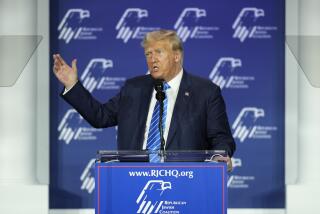Israel Has Right to Exist, Mandela Tells U.S. Jews : Mideast: The delegation welcomes his stand despite call for PLO talks, surrender of occupied areas.
- Share via
GENEVA — South African black nationalist leader Nelson Mandela has rejected all forms of anti-Semitism and recognized Israel’s right to exist within secure borders, the head of a U.S. Jewish delegation that met with Mandela said Sunday.
Members of the Jewish delegation said their meeting with Mandela exceeded their “fondest expectations,” even though they said he called for direct talks between Israel and the Palestine Liberation Organization and urged Israel to surrender the occupied territories. They said Mandela should be warmly welcomed when he visits the United States beginning June 20.
Henry Siegman, executive director of the American Jewish Congress, told journalists after the 2 1/2-hour meeting that Mandela said his African National Congress “accepts unequivocally the existence of the state of Israel, not only de facto but also its legal right to exist . . . within secure borders.”
Several U.S. Jewish groups recently said they would protest Mandela’s visit to the United States because he had compared the struggle of Palestinians to that of black South Africans and publicly embraced PLO Chairman Yasser Arafat.
The Jewish delegation made a special trip to Geneva to seek clarification of Mandela’s positions.
Siegman said the meeting, which lasted 90 minutes longer than expected, put an end to the concerns, even though the Jewish delegation disagreed with Mandela’s views on talks between Israel and the PLO.
Siegman said the ANC deputy president criticized the Israeli government’s treatment of Palestinians and called on Jerusalem to hold direct talks with the PLO to settle the 30-month-old Palestinian uprising in the territories occupied by Israel.
Speaking at a news conference, Siegman quoted Mandela as saying that Israel’s borders should not encompass the Golan Heights, the Gaza Strip and the West Bank, which were captured by Israel in the 1967 Middle East War.
Mandela’s views are certain to be unpopular with the new right-wing government now being formed in Israel. It opposes any territorial concessions to the Palestinians and favors pursuing a peace plan that would give only limited autonomy to the 1.7 million Palestinians in the occupied lands.
Nevertheless, Siegman, who coordinated the visit of the Jewish leaders to Geneva, said the Jewish community should “join actively and vigorously in extending a warm welcome” to Mandela during his 10-day U.S. visit.
He said Mandela would welcome an opportunity to visit Israel if invited by the government.
Siegman said Mandela was “extraordinarily forthcoming and enthusiastic” at the private meeting, held at a secret location. ANC representatives could not immediately be contacted for comment.
“I will probably raise my voice and proclaim he (Mandela) is a friend,” said Abraham Foxman, national director of the Anti-Defamation League of B’nai B’rith. “The meeting exceeded our fondest expectations. No Jewish organization should have any reservations about . . . the visit.”
The American Jewish Congress, National Jewish Community Relations Advisory Council, American Jewish Committee, Anti-Defamation League of B’nai B’rith and Union of American Hebrew Congregations were represented at the meeting.
Meanwhile, the Atlanta Journal-Constitution reported that a tip from the CIA to South African authorities led to Mandela’s arrest in 1962.
The newspaper quoted an anonymous retired “former intelligence officer” for the United States as saying that a senior American intelligence operative in South Africa told him of the spy agency’s role in helping South African police arrest Mandela on Aug. 5, 1962.
The paper quoted the unidentified source as saying there was no reason for continued secrecy about a CIA role in the black leader’s arrest for plotting to overthrow white-minority rule since the ANC deputy president was released from prison last February.
Within hours of Mandela’s arrest near Durban, the source said he was told of the agency’s role by Paul Eckel, described as a senior CIA operative in South Africa. Eckel moved to Atlanta after retiring and died in 1986.
The unidentified source said Eckel told him that the CIA’s information on Mandela’s whereabouts had come from a paid informant.
More to Read
Sign up for Essential California
The most important California stories and recommendations in your inbox every morning.
You may occasionally receive promotional content from the Los Angeles Times.












